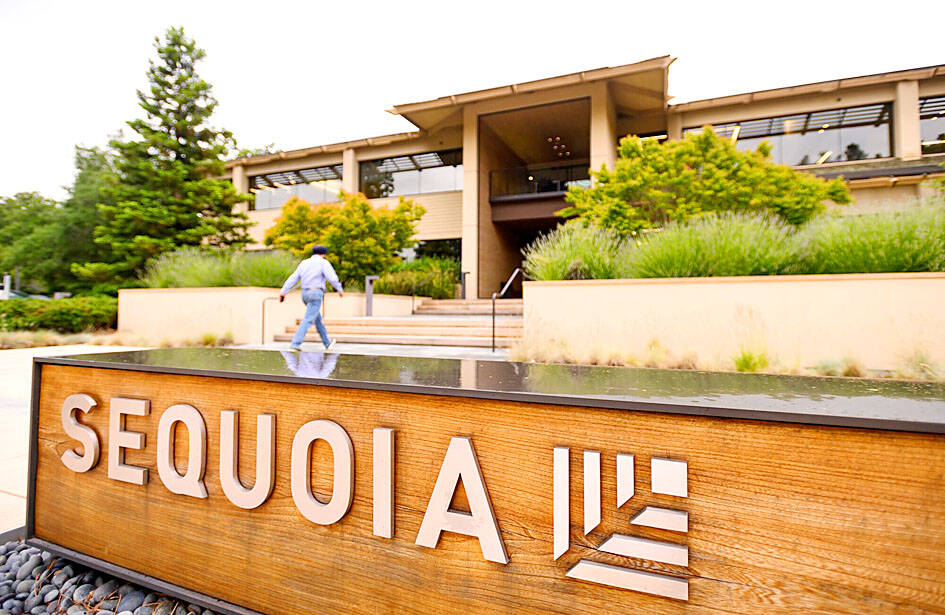A US congressional committee is targeting Sequoia Capital after starting investigations into several other venture capital firms for their investment in Chinese technology companies.
The US House of Representatives Select Committee on China is seeking information about Sequoia Capital’s investments into artificial intelligence, semiconductor and quantum computing companies in China, as well as its recently announced split into three firms.
In the split, Sequoia China was rebranded as HongShan (紅杉).

Photo: Bloomberg
US lawmakers asked Sequoia Capital and Sequoia China to provide information about each company it had backed based in the country, or with significant operations there, that was engaged in certain technologies.
The letter also requested information on dollar amounts, business expertise provided to the companies, investment criteria and the names of Chinese government investors.
“We’ve received the letter, are reviewing it and will respond,” a spokesperson for California-based Sequoia Capital said in a statement. “Since inception, each entity operating under the Sequoia brand has been independently owned, had separate investment teams, managed their own funds and made independent investment decisions. As announced in June, we will move to completely independent partnerships and become distinct firms with separate brands no later than March 31, 2024.”
The committee’s move is a setback for Sequoia Capital, which announced its formal split from Sequoia China before an executive order that placed some restrictions on China investing by US entities.
Analysts said that acting ahead of the order could defuse the potential of harsher actions, such as an order to divest from investments in China.
That is even though the order itself was less strict than some anticipated.
“In contrast to the executive order, the letter is a warning to all investors that the Select Committee is carefully scrutinizing past investments in addition to establishing a process to prevent certain future investments,” said H.K. Park, a managing director at Crumpton Global LLC, which has been advising clients on compliance.
The letter called out investments in start-ups Eversec Technology Co (恒安嘉新), 4Paradigm Technology Co (第四範式), DJI Technology Co (大疆創新), DeepGlint Information Technolgies Co (格靈深瞳) and ByteDance Ltd (字節跳動) — alleging that they are Sequoia China’s “problematic publicly known partnerships.”
The lawmakers also said that Sequoia China made as many as 40 investments in Chinese semiconductor companies since 2020.
Sequoia Capital is not the only venture capital firm being targeted by the committee, which has launched an investigation into GGV Capital, GSR Ventures, Walden International and Qualcomm Ventures.
The committee is also working on a report about US-China policy that would focus in large part on US business activity in the country.

Merida Industry Co (美利達) has seen signs of recovery in the US and European markets this year, as customers are gradually depleting their inventories, the bicycle maker told shareholders yesterday. Given robust growth in new orders at its Taiwanese factory, coupled with its subsidiaries’ improving performance, Merida said it remains confident about the bicycle market’s prospects and expects steady growth in its core business this year. CAUTION ON CHINA However, the company must handle the Chinese market with great caution, as sales of road bikes there have declined significantly, affecting its revenue and profitability, Merida said in a statement, adding that it would

Greek tourism student Katerina quit within a month of starting work at a five-star hotel in Halkidiki, one of the country’s top destinations, because she said conditions were so dire. Beyond the bad pay, the 22-year-old said that her working and living conditions were “miserable and unacceptable.” Millions holiday in Greece every year, but its vital tourism industry is finding it harder and harder to recruit Greeks to look after them. “I was asked to work in any department of the hotel where there was a need, from service to cleaning,” said Katerina, a tourism and marketing student, who would

i Gasoline and diesel prices at fuel stations are this week to rise NT$0.1 per liter, as tensions in the Middle East pushed crude oil prices higher last week, CPC Corp, Taiwan (台灣中油) and Formosa Petrochemical Corp (台塑石化) said yesterday. International crude oil prices last week rose for the third consecutive week due to an escalating conflict between Israel and Iran, as the market is concerned that the situation in the Middle East might affect crude oil supply, CPC and Formosa said in separate statements. Front-month Brent crude oil futures — the international oil benchmark — rose 3.75 percent to settle at US$77.01

RISING: Strong exports, and life insurance companies’ efforts to manage currency risks indicates the NT dollar would eventually pass the 29 level, an expert said The New Taiwan dollar yesterday rallied to its strongest in three years amid inflows to the nation’s stock market and broad-based weakness in the US dollar. Exporter sales of the US currency and a repatriation of funds from local asset managers also played a role, said two traders, who asked not to be identified as they were not authorized to speak publicly. State-owned banks were seen buying the greenback yesterday, but only at a moderate scale, the traders said. The local currency gained 0.77 percent, outperforming almost all of its Asian peers, to close at NT$29.165 per US dollar in Taipei trading yesterday. The